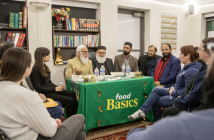Hanson: Police service making strides in counter-radicalization efforts, but ‘we need to up our game’
Calgary Herald | January 02, 2015

Calgary’s police chief says the service needs to “up its game” when it comes to creating an effective intervention system to help Calgarians who suspect their loved ones have been radicalized.
“Our intervention strategies are great as they stand,” Rick Hanson told the Herald in a recent interview. “We’re recognizing though that we need to up our game as it relates to those young men who are out of the school system, out in the real world, and ones that family members might identify as exhibiting behaviours that are indicative of perhaps them making bad decisions.”
Hanson said there needs to be a system where concerned family members can call to enlist the help of police, which then initiates some sort of intervention response, and helps the family to work with the young man or woman in countering the information they are getting.
“We’re working toward something that will work there, that would build trust in the community, recognizing that sometimes the person is a family member who they’re concerned about may have already crossed the line, may already have committed criminal activities, in which case it’s our job or the RCMP job to investigate that. But in the meantime, we recognize that we’ve got to maintain our connections with the community and continue to build strategies that address the existing need,” he said.
But Imam Syed Soharwardy, founder of the Islamic Supreme Council of Canada, argued not every parent will turn to authorities if they suspect their child is being radicalized, due to language barriers, fear of police or other cultural reasons.
“I’m not disagreeing with the chief. These are steps in the right direction,” Soharwardy said. “But we have to go beyond reactionary mode. I want them to be proactive, to go to the source and find out who is brainwashing and who is responsible for funding the travels for radicalization.”
Federal officials believe at least 130 Canadians, mostly young men, have been recruited by radical groups to fight in Syria and Iraq, and city police suspect at least 30 Calgarians are among the recruits.
The Calgary Police Service has been working with partners in combatting homegrown terrorism, work that has included, most recently, a gathering in November with local Muslim leaders for closed-door discussions on curbing youth radicalization.
Hanson takes issue with people referring to Calgary as “the hotbed of radicalization and recruitment in Canada,” emphasizing that this is an issue that the country as a whole is facing.
“We had a counter-radicalization conference in mid-November, we had speakers from all over the world and some in Canada that are experts, and coming out of that was the assurance that Calgary is at no more risk than any other city in this country. It’s important for people to know that,” he said.
He said he’s confident with the model the police service has established, which focuses on early intervention strategies and identifying risk factors of young people attracted to radicalization, which are similar to the risk factors that draw young people to gangs and other criminal activities. Police are now taking these efforts to the next step, he added.
Chris Boudreau, whose son Damian Clairmont was reportedly killed last winter while fighting with radical groups in Syria, said the intervention program Hanson is hoping to implement sounds similar to one she has been working to bring to Calgary, called Hayat.
Hayat is a German-based organization working to prevent the radicalization of Muslims through co-ordinated intervention and counselling with family and government agencies.
Whether the police service is forging ahead with Hayat or with another initiative, the important thing is that the efforts are all co-ordinated and that everyone involved is talking to each other, Boudreau said.
“With autonomous standalone initiatives, we’re not going to get the full impact and we’ll still have a lot of gaps,” she said. “We need a strong united front and to work together, to have continuity and consistency, and better communication in better developing these initiatives.”




